China Insight
China’s Celebrity Diplomats: The Online Fan Culture Surrounding Foreign Ministry Spokesperson Wang Wenbin
The fan culture surrounding Wang Wenbin comes at a time when China’s ‘diplomat dream team’ already has a steady fanbase on social media.
Published
2 years agoon

PREMIUM CONTENT | ARCHIVE
From TikTok fan videos to Weibo super topics – there’s a lively fan culture surrounding China’s Ministry of Foreign Affairs spokesperson Wang Wenbin. He is not the only ‘celebrity spokesperson’ on Chinese social media. Fans see China’s diplomats as national heroes and online idols.
In December of 2022, Wang Wenbin, top diplomat and the 32nd spokesperson for China’s Ministry of Foreign Affairs, was spotted out and about at Huangshan Mountain by Chinese netizens.
Soon, videos of Wang spread on Weibo and Douyin, where many people expressed excitement about seeing the top diplomat at the popular tourist spot and outside of the usual formal setting.
Wang Wenbing (汪文斌, b. 1971) is the Deputy Director of the Foreign Ministry Information Department of China. He studied at China’s Foreign Affairs University, majoring in French and economics, and has been working for China’s Foreign Ministry since 1993. Wang previously also took up the post as ambassador in Tunisia from 2018 to 2020.
Wang was in Huangshan, Anhui, to attend a visit of various international VIP guests from the IMF, World Bank, OECD, etc. on the occasion of the Seventh “1 6” Roundtable, which convened in the province of Anhui. Wang Wenbin originally is from Xindu village in Tongcheng, Anhui.
The fact that Wang was spotted in Anhui at that time was noteworthy. It was the first time since Covid that various Chinese officials welcomed and entertained international guests, marking an end to China’s zero-Covid era; and it was all taking place in Wang’s home province, where he is also known as “Anhui’s pride.”
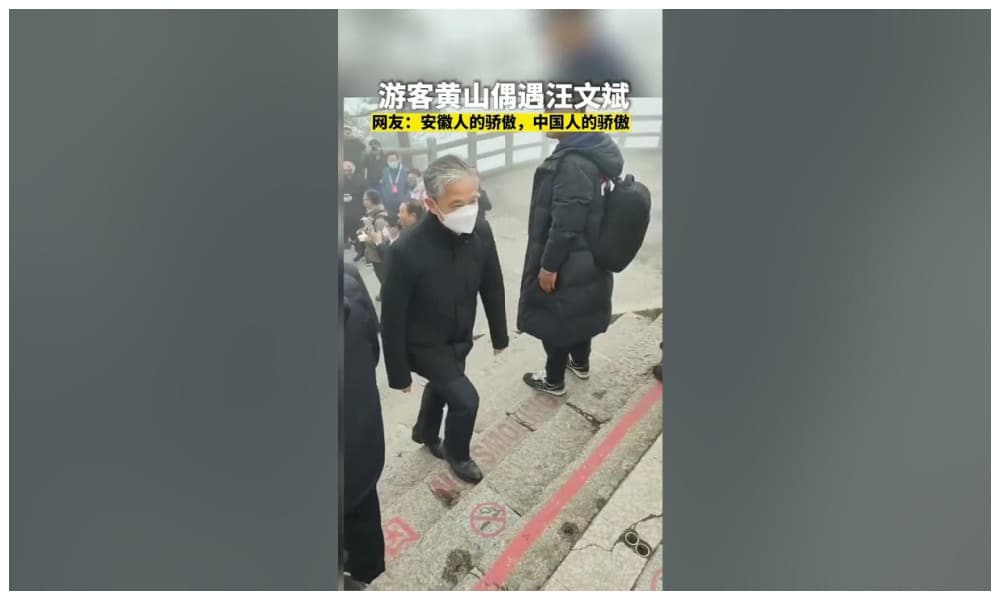
Wang Wenbin, top diplomat and spokesperson for China's MFA, was out and about in Anhui, and many people were happy to see him IRL and posted their videos of him on social media,calling him “the pride of Anhui, the pride of China.”
The 2022 excitement on Chinese social media surrounding the new Wang Wenbin videos went far beyond ‘Anhui’s pride’ alone; it showed the wider popularity of the top official on Chinese social media and signaled a broader trend of Chinese diplomats becoming online celebrities.
From fan videos on Douyin (TikTok) and Bilibili to discussion threads on Zhihu, Chinese diplomats have become idolized on social media over the past few years. Besides all the fan accounts on various Chinese social media platforms, Wang Wenbin also has dedicated ‘super topic’ communities on Weibo, which are forums focused on particular topics or celebrities.
There is the “Wang Wenbin Super Topic” page and also the “Wang Wenbing Exchange” (汪文斌交流) and the Wang Wenbin’s Bin’s Sweets” forum (汪文斌的斌糖). These public online forums contain thousands of posts dedicated to Wang.
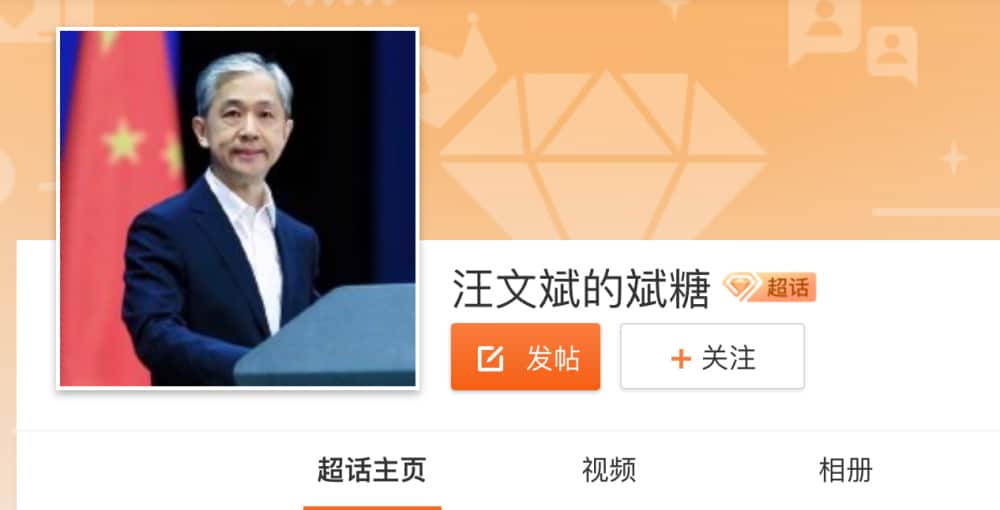
One of the supertopic forums on Weibo dedicated to Wang Wenbin.
The Wang Wenbin supertopic pages are all about content featuring Wang in his role as the spokesperson of the Foreign Ministry, replying to various questions during regular press conferences. Netizens are creative in editing images of Wang, adding quotes or drawings, and they make special fan videos.
Some of these videos have added texts or special effects, showing Wang Wenbin surrounded by sparkles and floating hearts as a sign of affection. Commenters praise Wang for being “so simple, so assertive,” while others complement the diplomat on being so “hard-working,” “concise and comprehensive.”
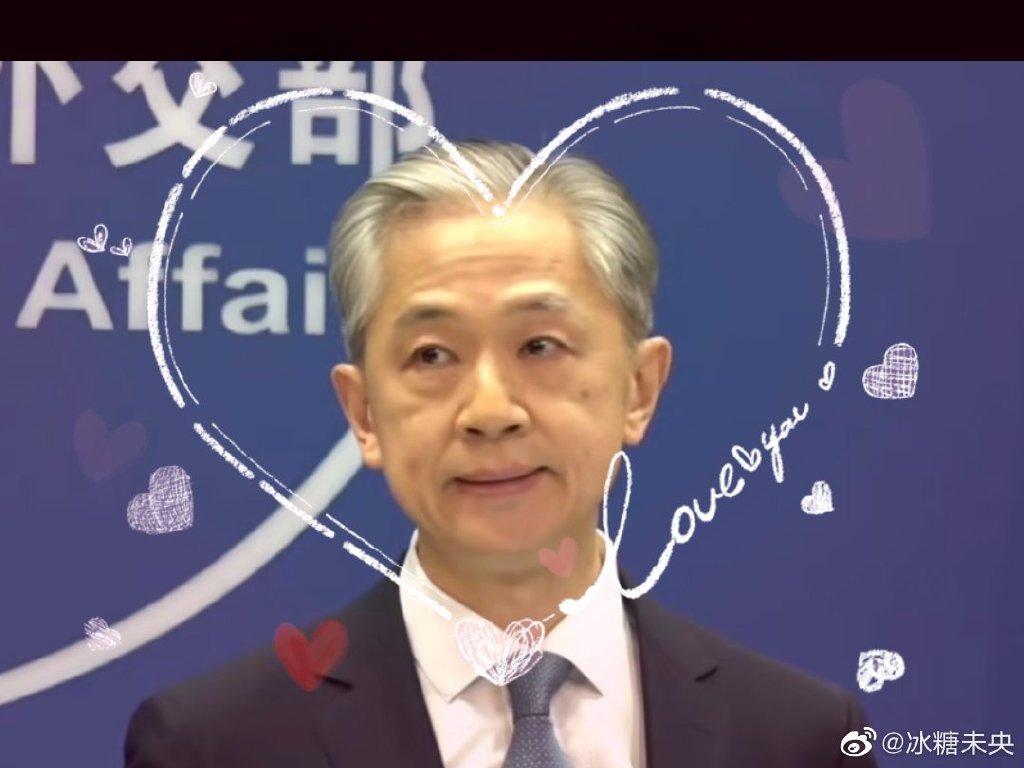
Wang Wenbin ‘fan art’ on one of the supertopic pages.
There are also those who praise Wang’s looks and expressions, saying his facial features are “handsome,” “cute,” “adorable,” and saying that ‘Uncle Wang’ is just too “cool.”
At a time of growing U.S.-China tensions and recurring international hot issues including China’s stance on the war in Ukraine and the Taiwan question, Wang Wenbin and his immediate colleagues Mao Ning (毛宁) and Hua Chunying (华春莹) are featured more prominently on social media by official media accounts that highlight answers given during the regular Foreign Ministry press conferences, which are held five times per week.
As Wang Wenbin is given greater visibility on Chinese social media by state media accounts, the online fan communities dedicated to Wang grow more lively as they have more material to express their enthusiasm about the Foreign Ministry spokesperson.
DIPLOMAT DREAM TEAM
Chinese Diplomats Becoming Celebrities
Wang is not the first Chinese top official or diplomat to become an online celebrity. Former Foreign Ministry spokesperson Zhao Lijian (赵立坚) previously also became very popular among Chinese netizens.
Zhao rose to popularity in 2020, the year he started his job as the spokesperson for the Ministry of Foreign Affairs (MFA), and many netizens loved him for his “disarming smile” and because of his demeanor, as many joked Zhao often looked like he could not wait to get off work.
An online meme culture developed around Zhao, who often repeated certain phrases or expressions during press conferences. Among them was the expression “shìmù yǐdài” (拭目以待), to eagerly wait for something to happen, literally meaning “to wipe one’s eyes and wait” (e.g. he used it in 2022 in the context of China waiting to see if Pelosi would actually dare to visit Taiwan or not). Phrases such as these became widely known and were used in affectionate online jokes about Zhao.
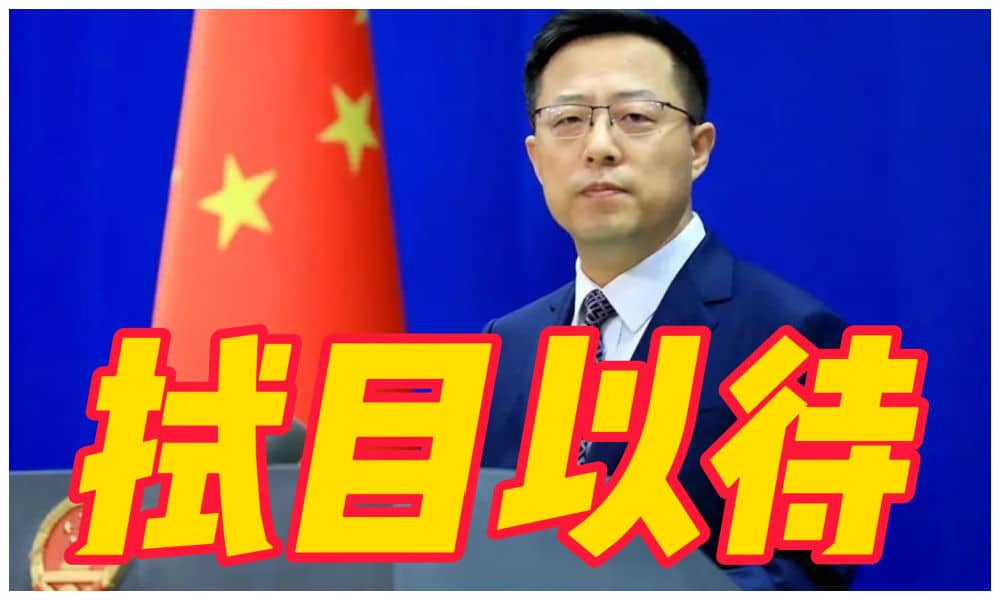
Shìmù yǐdài 拭目以待, to eagerly wait for something to happen, literally “to wipe one’s eyes and wait,” is one of Zhao Lijian’s famous phrases.
Even though Zhao was moved from his position as spokesperson and transferred to the Boundary and Ocean Affairs department earlier in 2023, there are still online communities dedicated to him where new posts with Zhao-related images, gifs, and videos keep flooding in.
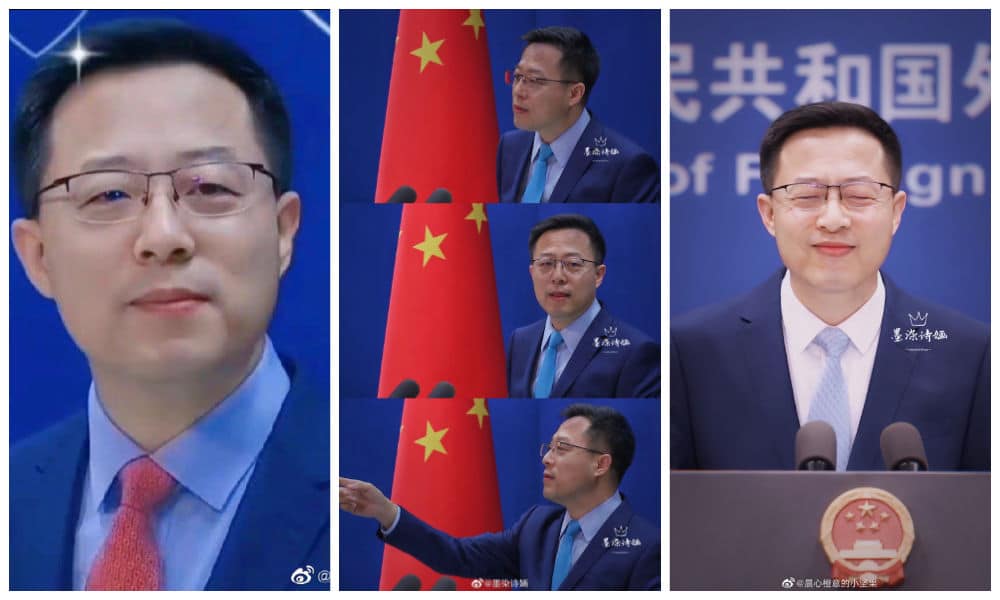
Even though Zhao has left his post as spokesperson, the online communities dedicated to him are still lively.
Before Zhao’s rise to fame, China’s MFA spokespeople and other diplomats had already gained an online fanbase. Around 2017, the concept of China’s “diplomat dream team” (外交天团) started to be used more frequently by Chinese media and social media users.
This was around the same time when Hong Lei (洪磊), Geng Shuang (耿爽), Lu Kang (陆慷), and Hua Chunying (华春莹) served as spokespeople for the Foreign Ministry and when their remarks on diplomatic events carried a more assertive and confrontational tone of voice facing heightening tensions with the U.S. over trade, the South China Sea, and human rights.
For example, China Daily ran an article about the “wonderful responses” from China’s diplomat dream team in 2017 (link) and they ran another similar one in 2018 (link).
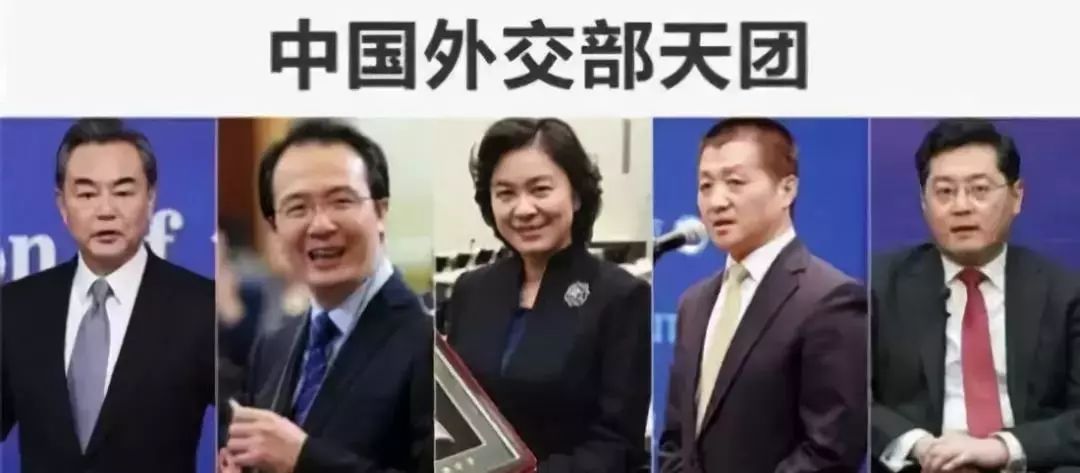
An early example of China’s “Diplomat Dream Team.” Left: China’s top diplomat Wang Yi, former spokesperson Hong Lei, spokesperson Hua Chunying, diplomat Lu Kang, and Minister of Foreign Affairs Qin Gang.
But it was not until 2020 when China’s top diplomats and the “spokesperson top team” (发言人天团) really garnered online attention as they were often featured in headlines and created a stir.
Not only was 2020 the year that ‘celebrity diplomat’ Zhao Lijian joined the spokesperson team, it was also a year of complex international developments including the Covid outbreak and worsening diplomatic relations between the U.S. and China driven by ‘eye for an eye’ strategies; one day after the Chinese consulate in Houston was forced to close, China also ordered the American consulate in Chengdu to shut its doors.
In July of 2020, Wang Wenbin joined the ‘top team’ of Chinese diplomats, which was praised online as China’s “strongest diplomatic mission.”
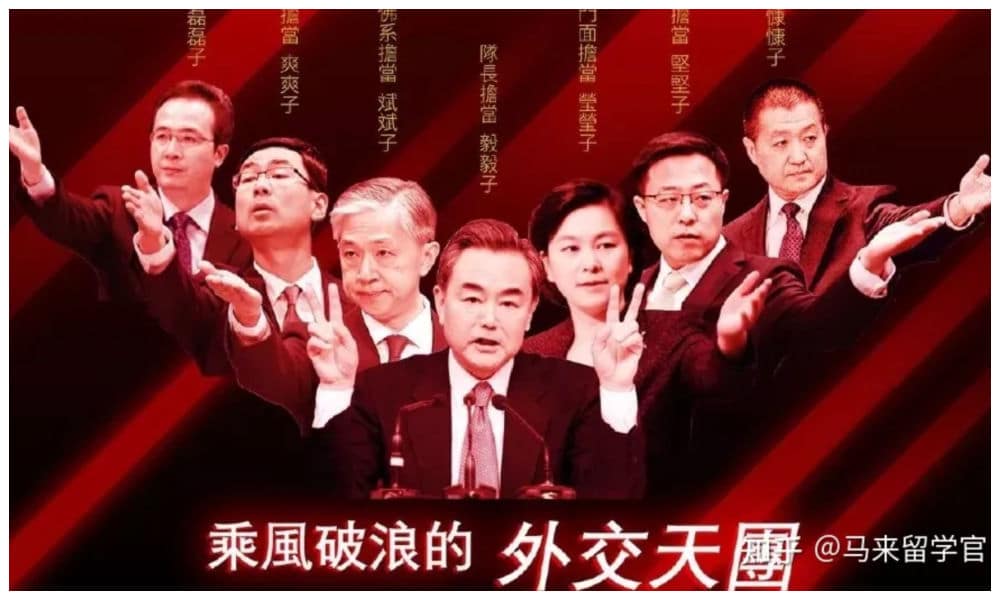
China’s “diplomat top team,” image via Zhihu blogger.
In 2021, the top-level US-China talks in Alaska further contributed to the social media frenzy surrounding China’s diplomatic corps. Foreign Minister Wang Yi, also nicknamed the ‘captain’ of the diplomatic team, traveled to Anchorage with Chinese top diplomat Yang Jiechi (杨洁篪) for the tough meeting. Before entering a session of the high-level talks, the diplomats were filmed walking together when Wang asked Yang if he had lunch, with Yang then answering: “Yes, I had instant noodles.”
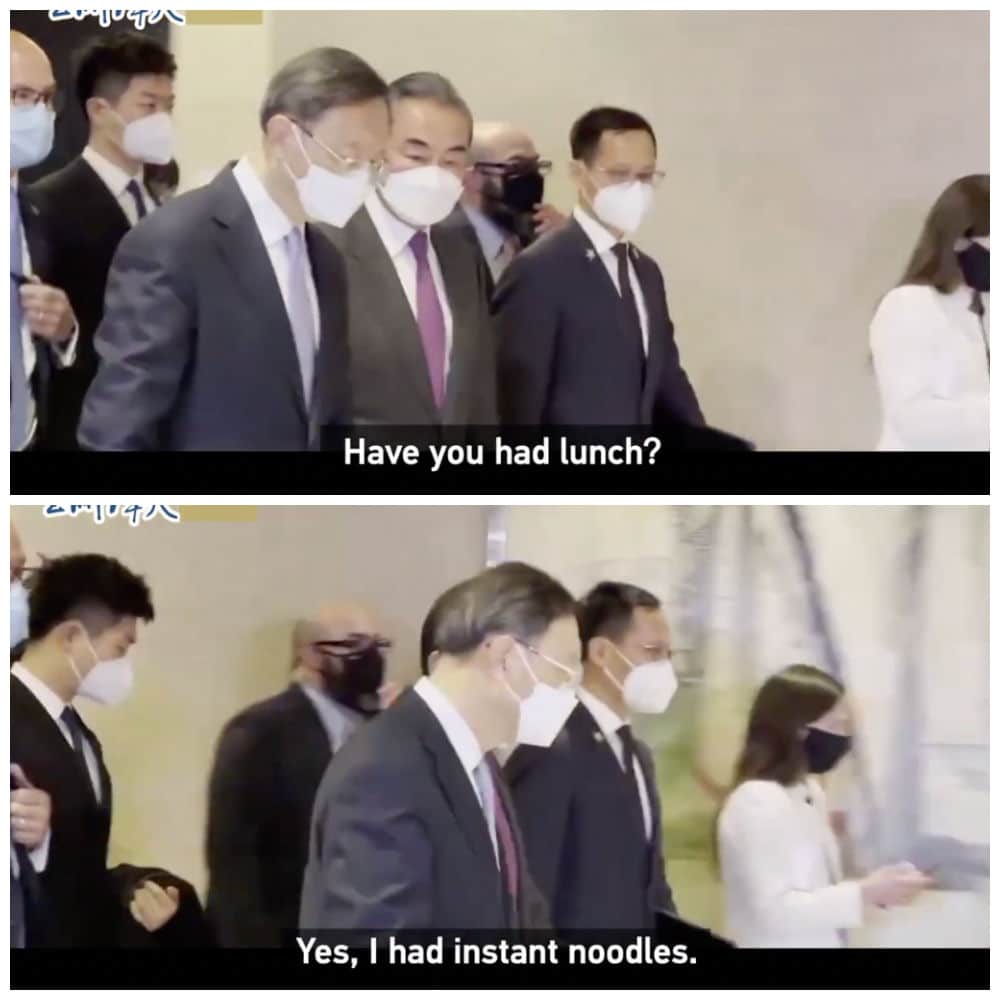
‘Noodle gate’ blew up on Chinese socials, where many saw the incident as a sign of American inhospitality and rude treatment of the Chinese top diplomats. The incident also added to the popularity of Yang Jiechi and Wang Yi.
There are various reasons why Chinese diplomats and MFA representatives have become particularly popular over the past few years.
Some of the main causes related to the celebrity culture surrounding Chinese modern-day diplomats lies in (1) their new role in China’s (online) media environment, (2) the way they have become an example to ordinary people, and (3) the shift in Chinese diplomacy that has turned them into ‘wolf warrior’ heroes.
1. CHINESE DIPLOMATS & SOCIAL MEDIA
Chinese Diplomacy in the Age of Social Media
The growing fame of Chinese diplomats and spokespeople is very much an online phenomenon, and so their surge in popularity goes hand in hand with the rise of (China’s) social media.
The role of social media is crucial in three ways. First, Chinese official accounts and state media use social media as an important channel to spread official propaganda and narratives. Although China’s MFA spokespersons are meant to be the face of China to the world, their role is just important – and perhaps even more weighty – for the audiences at home as symbols of China’s foreign policies.
Second, social media is also increasingly used by Chinese diplomats individually as a platform to voice the stances they represent. In an article titled “China’s Internet Celebrity Diplomats” (2020), Christian Shepherd described how Zhao Lijian used social media to build “a personal brand that is rare for a Foreign Ministry spokesperson” as China’s most high-profile official on Twitter.
In our 2020 article about this topic, What’s on Weibo found that there was a significant surge in Chinese official accounts arriving on Twitter in 2019 and in early 2020. The first surge of Chinese diplomatic accounts happened in 2019 at the time of the Hong Kong Protests; a second peak in Chinese official accounts joining Twitter took place in the period of January to March 2020 during the international Covid-19 crisis.
At the time of writing, Zhao has over two million followers on Twitter (@zlj517). Zhao Lijian is also active on Weibo (@赵立坚个人微博), where he has over 8 million fans. Foreign Ministry spokesperson Hua Chunying is not active on Weibo, but she has two million followers on Twitter (@Hua Chunying 华春莹).

Wang Wenbin, Geng Shuang, Wang Yi, Hua Cunying, Zhao Lijian.
Third, social media platforms allow for communities to form around Chinese diplomats in a way that would be unthinkable in the pre-social media era.
There has been a lot of attention for celebrities taking on diplomatic roles, but less so for diplomats taking on celebrity roles. Studies about diplomats or politicians becoming internet celebrities often focus on those who are also active on social media themselves, making them more accessible and relatable.
But diplomats such as Wang Wenbin are an exception: Wang Wenbin does not have an official Twitter account, nor is he active on Weibo or any other popular social media platforms. Nevertheless, there are thriving online communities surrounding him that help bridge the divide between the top level diplomat and ordinary people, creating connections between diplomats and Chinese people in novel ways.
In the Chinese social media environment, the fan culture surrounding China’s top diplomats is fuelled by the dynamics of the official propaganda apparatus and state media campaigns disseminating hashtags and videos that underline the main messages of China’s Foreign Ministry. Although it often builds on official media content, the online fan culture itself is non-official and functions in similar ways as other idol fan communities do.
2. CHINESE DIPLOMATS & THE PEOPLE
The Person Behind the Diplomat
There is another dimension to the online interaction between netizens and the Chinese Ministry of Foreign Affairs spokespersons and diplomats. They are not just being idolized, they are also being humanized.
Besides the more serious patriotic and nationalist videos, it is often the small flaws and funny interactions that go trending on social media and make China’s diplomats more likeable to the audience.
Fans of Wang Wenbin or Zhao Lijian like to create images or videos that highlight the moments in which the diplomats share a quick smile, make a little mistake, or are caught in a situation that is different from their usual role as spokesperson.
It might be as small as a strand of hair sticking out during a speech, a misunderstanding with a journalist, or how Wang Wenbin is fiddling with his translation headset during an international conference. These kind of moments are not highlighted to ridicule the diplomat; on the contrary, netizens treasure these moments in which diplomats become more likable and relatable.
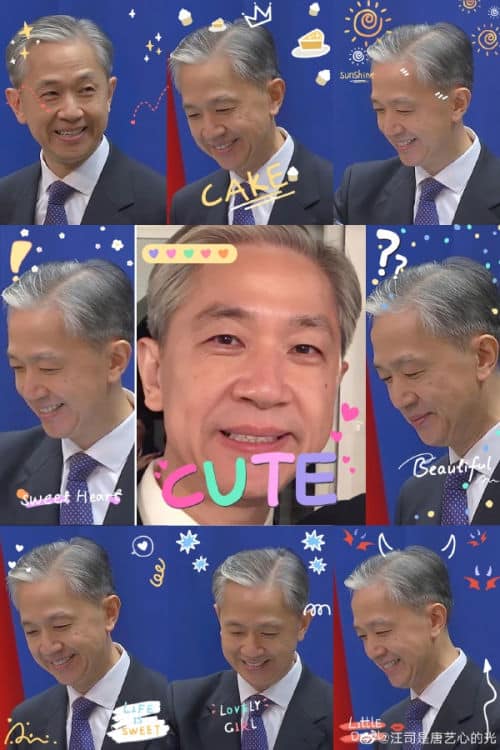
Another way in which netizens like to catch a glimpse of the private person behind the public diplomat is by sharing old photos and getting to know more about them in their younger years.
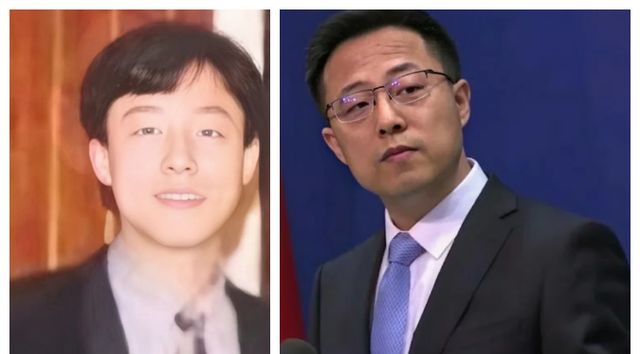
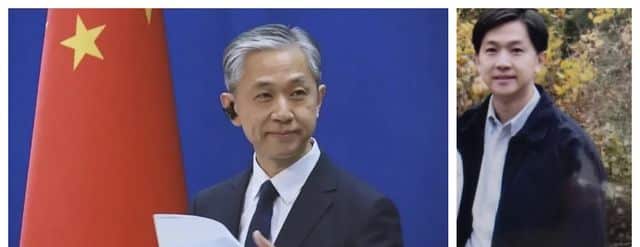
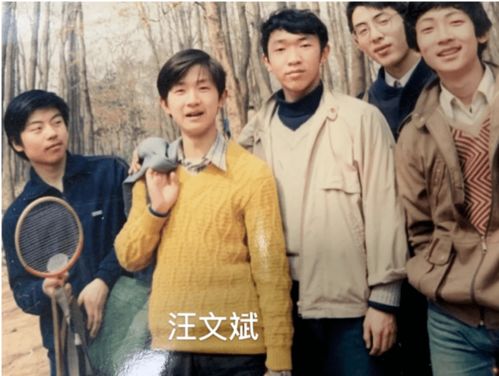
Wang Wenbin in his younger years.
On Weibo, Bilibili, and Douyin, there are dozens of videos comparing photos of Chinese diplomats, including Wang, in their younger years versus now (e.g. 外交天团年轻的样子).
For many fans, Chinese diplomats also serve as an inspiration. “I love them, they’re my role models,” one Weibo blogger writes, posting photos of diplomats such as Wang Yi, Hua Chunying, Zhao Lijian, Hong Lei, Geng Shuang, and Lu Kang.
For many, Wang Wenbin especially is a role model because of his language skills. Wang speaks several foreign languages including English and French. He previously also attracted attention for sending out new year’s wishes in 11 different languages.
“I really like him because he encourages me to do well in my studies,” one fan account (@是汪叔和赵叔啊) writes.
3. CHINESE DIPLOMATS & THE WORLD
Wolf Warrior Heroes
The widespread admiration for Chinese diplomats and MFA spokespersons has various social, cultural, and historical reasons, and nationalism also plays a big role in this, as their growing online popularity is accompanied by the rise of so-called “wolf-warrior diplomacy” and the soaring cyber nationalism that comes with it.
The term “wolf warrior diplomacy” (战狼外交) became a buzzword for China’s diplomacy since around 2020 (Dai & Luqiu 2022). It is a reference to the highly successful Chinese blockbusters Wolf Warrior (战狼, 2015) and Wolf Warrior II (战狼2, 2017), and basically means a style of diplomacy that uses a much harsher and more confrontational rhetoric – which poses a contrast to a more restrained and softer tactic in foreign diplomacy.
Hua Chunying and Zhao Lijian were among the most visible wolf warrior diplomats as they were the main MFA spokespersons in early 2020 and were both active on Twitter, where they also actively confronted external criticism of China.
Zhao Lijian also became known for tweeting out a photoshopped image of an Australian soldier murdering a child, alluding to a report on unlawful killings of Afghan civilians and prisoners by Australian troops. His controversial post led to Australian Prime Minister Scott Morrison demanding an apology from China (read more about this kind of political visuals in our article here).
In a 2022 article titled “Why Have Chinese Diplomats Become So Aggressive?,” author Nien-chung Chang-Liao argues that China’s more aggressive style of diplomacy is not just meant to persuade foreign audiences to accept Chinese narratives in international relations, but could also be viewed as a way to appeal to nationalist attitudes at home, while also demonstrating loyalty to the Party and Xi Jinping – who emphasizes the need for confidence in China’s new era.
The approach seems fruitful: over 70% of respondents to a survey by Global Times allegedly indicated that they thought a ‘wolf-warrior’ style diplomacy improves China’s global image. Chinese Foreign Ministry spokesperson Hua Chunying also indicated that she had no issue with the ‘wolf warrior’ label and even embraces it (Chang-liao 2022, 179-181).
While Zhao Lijian was known as the real ‘wolf warrior diplomat,’ Wang Wenbin’s style is perceived as being more “calm,” “scholarly,” and “refined,” even though he he still seen as critical and assertive.
Recently, it was Wang Wenbin who slammed U.S. claims that China might arm Russian troops in the war in Ukraine, saying “it is the United States and not China that is endlessly shipping weapons to the battlefield.” Wang also called the shootdown of the alleged Chinese spy balloon “100 percent hysteria,” and he recently urged the United States to give up its “hegemonic” approaches to international affairs.
For many Wang Wenbin fans, this style of assertive yet ‘refined’ foreign policy strikes a chord, as they support how Wang shapes China’s image abroad: “It’s the perfect interpretation of being a great and elegant great power.”
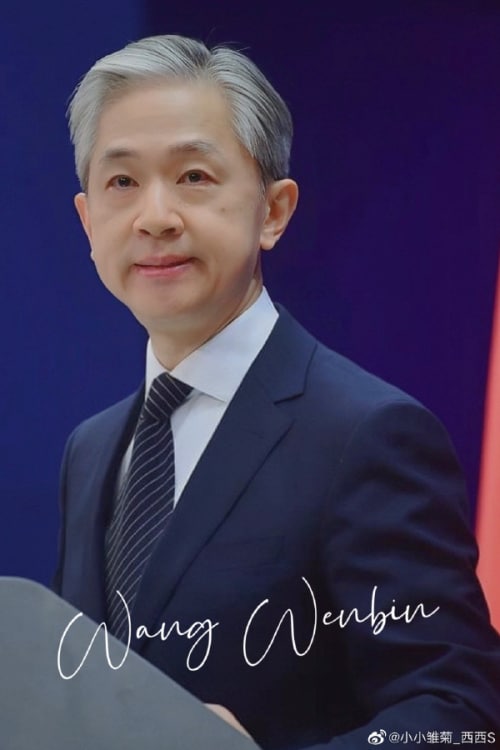
“Today’s problems are complex and manifold, but Uncle [Wang] is organized and clear and answers with a smile. From beginning to end, I always admire him,” one comment says.
One Weibo blogger writes to Wang: “You’re so busy, you must be tired. I hope you can also take some time to rest. I just wish you all the best.”
Another fan writes: “Uncle, you work so hard, you are not afraid of facing the ‘hail of bullets’ fired at you by foreign media in the blue room, you defend our country, you are our hero!”
By Manya Koetse
Get the story behind the hashtag. Subscribe to What’s on Weibo here to receive our newsletter and get access to our latest articles:
References
Chang-Liao, Nien-chung. 2022. “Why Have Chinese Diplomats Become So
Aggressive?” Survival, 64:1: 179-190.
Dai, Yaoyao, and Luwei Rose Luqiu. 2022. “Wolf Warriors and Diplomacy in the New Era.” China Review 22 (2): 253-283.
Shepherd, Christian. 2020. “China’s Internet Celebrity Diplomats.” Australian Financial Review, Dec. 10, page 27.
Spotted a mistake or want to add something? Please let us know in comments below or email us. First-time commenters, please be patient – we will have to manually approve your comment before it appears.
©2023 Whatsonweibo. All rights reserved. Do not reproduce our content without permission – you can contact us at info@whatsonweibo.com.
Manya is the founder and editor-in-chief of What's on Weibo, offering independent analysis of social trends, online media, and digital culture in China for over a decade. Subscribe to gain access to content, including the Weibo Watch newsletter, which provides deeper insights into the China trends that matter. More about Manya at manyakoetse.com or follow on X.

You may like
China Insight
Squat or Sit? China’s Great Toilet Debate and the Problem of Footprints on the Seat
From squatting to standing on seats: the messy reality of sitting toilets in Beijing malls.
Published
3 days agoon
March 25, 2025
FROM THE WEIBO WATCH PREMIUM NEWSLETTER
Shoe prints on top of the toilet seat are never a pretty sight. To prevent people from squatting over Western-style sitting toilets, there are some places that will place stickers above the toilet, reminding people that standing on the seat is strictly forbidden.

For years, this problem has sparked debate. Initially, these discussions would mostly take place outside of China, in places with a large number of Chinese tourists. In Switzerland, for example, the famous Rigi Railways caused controversy for introducing separate trains with special signs explaining to tourists, especially from China, how (not) to use the toilet.
Squat toilets are common across public areas in China, especially in rural regions, for a mix of historical, cultural, and practical reasons. There is also a long-held belief — backed by studies (like here or here) — that the squatting position is healthier for bowel movements (for more about the history of squat toilets in China, see Sixth Tone’s insightful article here).
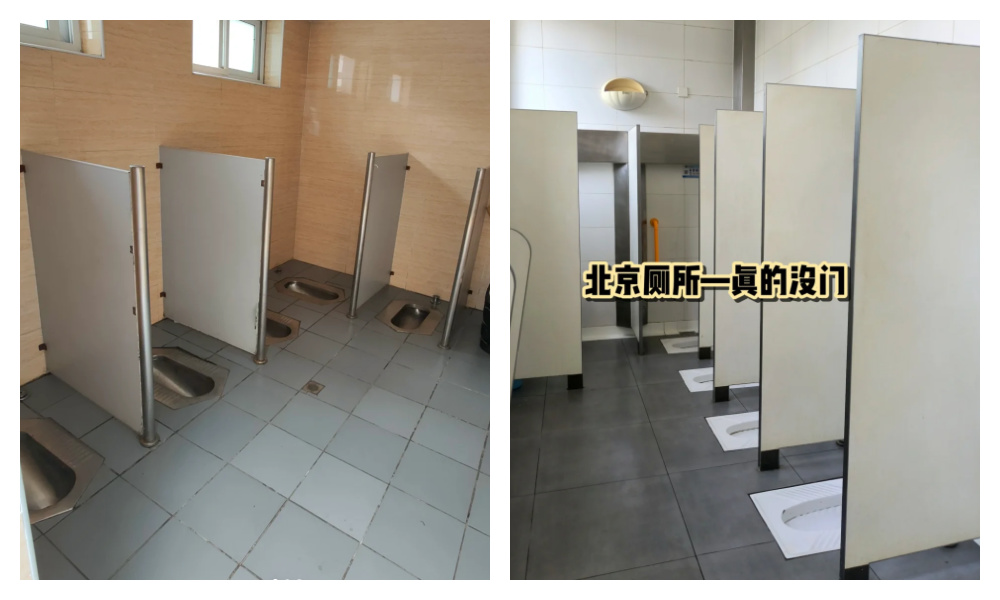
Public squatting toilets in Beijing, images via Xiaohongshu.
Without access to the ground-level squat toilets they are used to — and feel more comfortable with — some people will climb on top of sitting toilets to use them in the way they’re accustomed to, seeing squatting as the more natural and hygienic method.

Not only does this make the toilet seat all messy and muddy, it is also quite a dangerous stunt to pull, can break the toilet, and lead to pee and poo going into all kinds of unintended directions. Quite shitty.

Squatting on toilets makes the seat dirty and can even break the toilet.
Along with the rapid modernization of Chinese public facilities and the country’s “Toilet Revolution” over the past decade, sitting toilets have become more common in urban areas, and thus the sitting-toilet-used-as-squat-toilet problem is increasingly becoming topic of public debate within China.
The Toilet Committee and Preference for Sitting Toilets
Is China slowly shifting to sitting toilets? Especially in modern malls in cities like Beijing, or even at airports, you see an increasing number of Western-style sitting toilets (坐厕) rather than squatting toilets (蹲厕).
This shift is due to several factors:
🚽📌 First, one major reason for the rise in sitting toilets in Chinese public places is to accommodate (foreign) tourists.
In 2015, China Daily reported that one of the most common complaints among international visitors was the poor condition of public toilets — a serious issue considering tourists are estimated to use public restrooms over 27 billion times per year.
That same year, China’s so-called “Toilet Revolution” (厕所革命) began gaining momentum. While not a centralized campaign, it marked a nationwide push to upgrade toilets across the country and improve sanitation systems to make them cleaner, safer, and more modern.
This movement was largely led by the tourism sector, with the needs of both domestic and international travelers in mind. These efforts, and the buzzword “Toilet Revolution,” especially gained attention when Xi Jinping publicly endorsed the campaign and connected it to promoting civilized tourism.
In that sense, China’s toilet revolution is also a “tourism toilet revolution” (旅游厕所革命), part of improving not just hygiene, but the national image presented to the world (Cheng et al. 2018; Li 2015).
🚽📌 Second, the growing number of sitting toilets in malls and other (semi)public spaces in Beijing relates to the idea that Western-style toilets are more sanitary.
Although various studies comparing the benefits of squatting and sitting toilets show mixed outcomes, sitting toilets — especially in shared restrooms — are generally considered more hygienic as they release fewer airborne germs after flushing and reduce the risk of infection (Ali 2022).
There are additional reasons why sitting toilets are favored in new toilet designs. According to Liang Ji (梁骥), vice-secretary of the Toilet Committee of the China Urban Environmental Sanitation Association (中国城市环境卫生协会厕所专业委员会), sitting toilets are also increasingly being introduced in public spaces due to practical concerns.
🚽📌 Squatting is not always easy, and can pose a safety risk, particularly for the elderly, pregnant women, and people with disabilities.
🚽📌 Then there are economic reasons: building squat toilets in malls (or elsewhere) requires a deeper floor design due to the sunken space needed below the fixture, which increases both construction time and cost.
🚽📌 Liang also points to an aesthetic factor: sitting toilets simply look more “high-end” and are easier to clean, which is why many consumer-oriented spaces prefer to install Western-style toilets.
So although there are plenty of reasons why sitting toilets are becoming a norm in newly built public spaces and trendy malls, they also lead to footprints on toilet seats — and all the problems that come with it.
The Catch 22 of Sitting vs Squad Toilets
This week, the issue became a trending topic on Weibo after Beijing News published an investigative report on it. The report suggested that most shopping malls in Beijing now have restrooms with sitting toilets, which should, in theory, be cleaner than the squat toilets of the past — but in reality, they’re often dirtier because people stand on them. This issue is more common in women’s restrooms, as men’s restrooms typically include urinals.
In researching the issue, a reporter visited several Beijing malls. In one women’s restroom, the reporter observed 23 people entering within five minutes. Although the restroom had only three squat toilets versus seven sitting ones, around 70% of the users opted for the squat toilets.
Upon inspection, most of the seven sitting toilets were dirty — despite being equipped with disposable seat covers — showing clear signs of urine stains and footprints. They found that sitting toilets being used as squat toilets is extremely common.
It’s a bit of a Catch-22. People generally prefer clean toilets, and there’s also a widespread preference for squat toilets. This leads to sitting toilets being used as squat toilets, which makes them dirty — reinforcing the preference for squat toilets, since the sitting toilets, though meant to be cleaner, end up dirtier.
In interviews with 20 women, nearly 80% said they either hover in a squat or directly squat on the toilet seat. One woman said, “I won’t sit unless I absolutely have to.” While some of those quoted in the article said that sitting toilets are more comfortable, especially for elderly people, they are still not preferred when the seats are not clean.
In the Beijing News article, the Toilet Committee’s Liang Ji suggested that while a balanced ratio of squat and sitting toilets is necessary, a gradual shift toward sitting toilets is likely the future for public restrooms in China.

How NOT to use the sitting toilet. Sign photographed by Xiaohongshu user @FREAK.00.com.
Liang also highlighted the importance of correct toilet use and the need to consider public habits in toilet design.
In Squatting We Trust
On Chinese social media, however, the majority of commenters support squatting toilets. One popular comment said:
💬 “Please make all public toilets squat toilets, with just one sitting toilet reserved for people with disabilities.”

Squatting toilets in a public toilet in a Beijing hutong area, image by Xiaohongshu user @00后饭桶.
The preference for squatting, however, doesn’t always come down to bowel movements or tradition. Many cite a lack of trust in how others use public toilets:
💬 “When it comes to things for public use, it’s best to reduce touching them directly. Honestly, I don’t trust other people…”
💬 “Squatting is the most hygienic. At least I don’t have to worry about touching something others touched with their skin.”
💬 “I hate it when all the toilets in the women’s restroom at the mall are sitting toilets. I’m almost mastering the art of doing the martial-arts squat (蹲马步).”
Others view the gradual shift toward sitting toilets as a result of Westernization:
💬 “Sitting toilets are a product of widespread ‘Westernization’ back in the day — the further south you go, the worse it gets.”
But some come to the defense of sitting toilets:
💬 “Are there really still people who think squat toilets are cleaner? The chances of stepping in poop with squat toilets are way higher than with sitting ones. Sitting toilet seats can be wiped with disinfectant or covered with paper. Some people only care about keeping themselves ‘clean’ without thinking about whether the next person might end up stepping in their mess.”
💬 One reply bluntly said: “I don’t use sitting toilets. If that’s all there is, I’ll just squat on top of it. Not even gonna bother wiping it.”
It’s clear this debate is far from over, and the issue of people standing on toilet seats isn’t going away anytime soon. As China’s toilet revolution continues, various Toilet Committees across the country may need to rethink their strategies — especially if they continue leaning toward installing more sitting toilets in public spaces.
As always, Taobao has a solution. For just 50 RMB (~$6.70), you can order an anti-slip sitting-to-squatting toilet aid through the popular e-commerce platform.
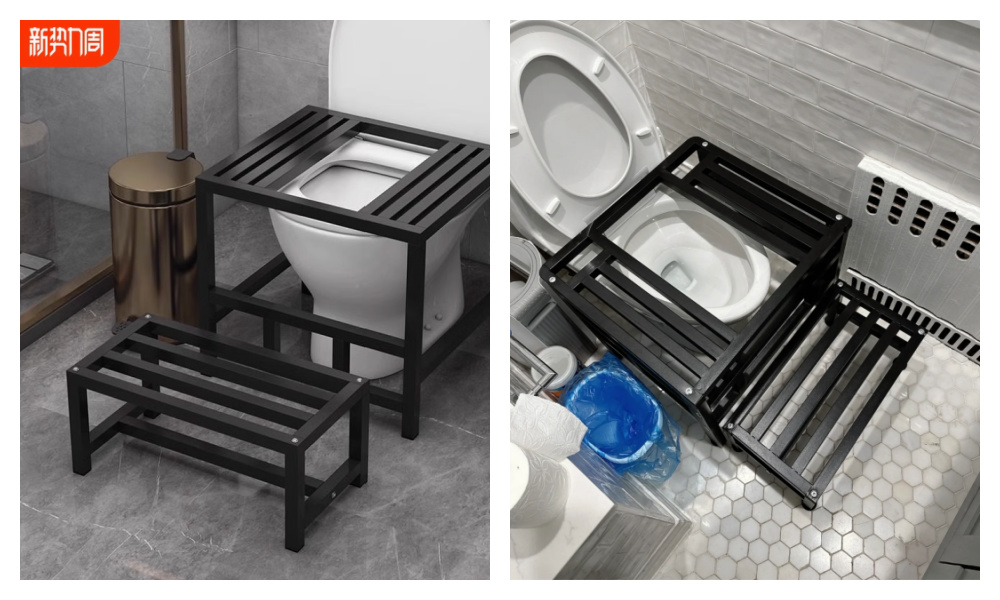
The Taobao solution.
For Chinese malls, offering these might be cheaper than dealing with broken toilets and the never-ending battle against footprints on toilet seats…
By Manya Koetse
(follow on X, LinkedIn, or Instagram)
References:
Ali, Wajid, Dong-zi An, Ya-fei Yang, Bei-bei Cui, Jia-xin Ma, Hao Zhu, Ming Li, Xiao-Jun Ai, and Cheng Yan. 2022. “Comparing Bioaerosol Emission after Flushing in Squat and Bidet Toilets: Quantitative Microbial Risk Assessment for Defecation and Hand Washing Postures.” Building and Environment 221: 109284. https://doi.org/10.1016/j.buildenv.2022.109284.
Bhattacharya, Sudip, Vijay Kumar Chattu, and Amarjeet Singh. 2019. “Health Promotion and Prevention of Bowel Disorders Through Toilet Designs: A Myth or Reality?” Journal of Education and Health Promotion 8 (40). https://doi.org/10.4103/jehp.jehp_198_18.
Cao, Jingrui 曹晶瑞, and Tian Jiexiong 田杰雄. 2025. “城市微调查|商场女卫生间,坐厕为何频频变“蹲坑”? [In Shopping Mall Women’s Restrooms, Why Do Sitting Toilets Frequently Turn into ‘Squat Toilets’?]” Beijing News, March 20. https://weibo.com/ttarticle/p/show?id=2309405146044773302810. Accessed March 19, 2025.
Cheng, Shikun, Zifu Li, Sayed Mohammad Nazim Uddin, Heinz-Peter Mang, Xiaoqin Zhou, Jian Zhang, Lei Zheng, and Lingling Zhang. 2018. “Toilet Revolution in China.” Journal of Environmental Management 216: 347–356. https://doi.org/10.1016/j.jenvman.2017.09.043.
Dai, Wangyun. 2018. “Seats, Squats, and Leaves: A Brief History of Chinese Toilets.” Sixth Tone, January 13. https://www.sixthtone.com/news/1001550. Accessed March 22, 2025.
Li, Jinzao. 2015. “Toilet Revolution for Tourism Evolution.” China Daily, April 7. https://europe.chinadaily.com.cn/opinion/2015-04/07/content_20012249_2.htm. Accessed March 22, 2025.
Spotted a mistake or want to add something? Please let us know in comments below or email us. First-time commenters, please be patient – we will have to manually approve your comment before it appears.
©2025 Whatsonweibo. All rights reserved. Do not reproduce our content without permission – you can contact us at info@whatsonweibo.com.
China Insight
US-Russia Rapprochement and “Saint Zelensky”: Chinese Online Reactions to Trump’s Shake-Up
From shifting sentiments on Zelensky to a renewed focus on Taiwan, recent geopolitical developments have sparked noteworthy takes from Chinese online commentators.
Published
3 weeks agoon
March 9, 2025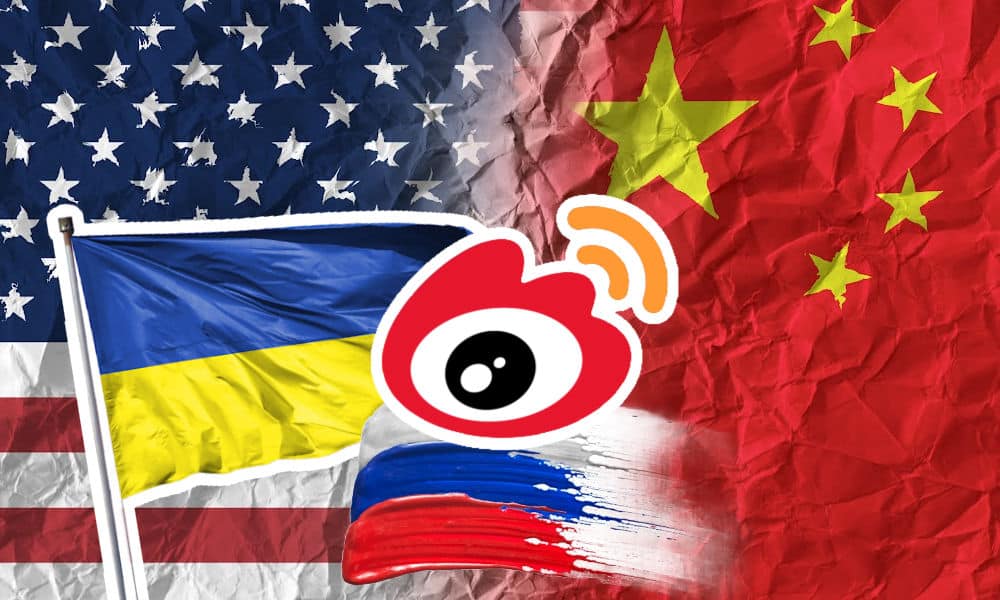
As the Russia-Ukraine war enters its fourth year, Chinese social media is once again flooded with discussions about the geopolitical shifts triggered by Trump’s policies. From the Oval Office clash to Trump’s ‘pivot’ to Russia, this article explores how Chinese netizens are interpreting the rapidly changing geopolitical landscape.
Three years ago, when the Russia-Ukraine war first broke out, one particular word went trending on Chinese social media: wūxīn gōngzuò (乌心工作). The term was a wordplay on the term wúxīn gōngzuò (无心工作), meaning not being in the mood to work, and it basically meant that people were too focused on Ukraine to concentrate on work.
Although that word has since faded from use online, recent geopolitical developments surrounding the Russia-Ukraine war have once again drawn considerable attention on Chinese social media, where trending word data tools show that “Trump” and “Zelensky” are among the hottest buzzwords of the moment.
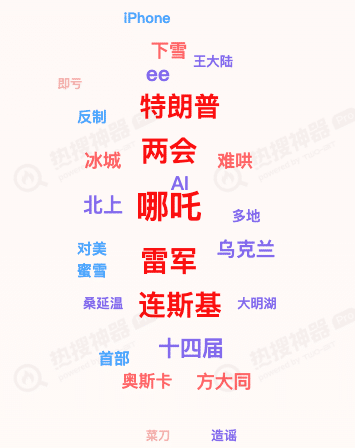
Trump Zelensky, Ne Zha, Lei Jun; biggest words of interest on, among others, Weibo, on March 4, 2025.
Trump’s recent rhetoric toward Russia, his remarks about Ukraine, and his attitude toward NATO not only mark a shift from Biden and decades of US policy, but also reshuffle the geopolitical cards and raise questions about the future of the postwar international order.
Where does China stand in all this?
➜ Although China’s online environment is tightly controlled, particularly regarding political discussions, what stands out in conversations around the recent developments involving Trump, Putin, and Zelensky is a widespread sentiment that — at its core — it’s all about China.
Many believe that China’s rise on the global stage, and the resulting US-China rivalry, are key forces shaping US strategy toward Russia as well.
Woven into these discussions are US-China trade tensions, with Trump increasing tariffs by 10% on February 1, and then doubling the tariff on all Chinese imports to 20% from 10% on March 4. This immediately prompted China to retaliate with 10-15% tariffs on US agricultural products, effective March 10.
Currently, developments are unfolding so rapidly that one hashtag after another is appearing on Chinese social media. “It’s not that I don’t understand, it’s just that the world is changing so quickly,” one Weibo blogger commented, referencing a famous song by Cui Jian (“不是我不明白,是这世界变化快”).
Amid this whirlwind of events, let’s take a closer look at the current Chinese online discourse surrounding the Russia-Ukraine war, with a focus on shifting attitudes toward Zelensky and US-Russian relations.
THE OVAL OFFICE INCIDENT
“Saint Zelensky is a real man!”
One major moment in the recent developments has been the clash between Zelensky, Trump, and US Vice President JD Vance in the White House Oval Office on February 28.
Zelensky had come to the White House to discuss the US’s continued support against Russia and a potential deal involving Ukraine’s rare earth minerals, but it ended in a heated confrontation during which, among others, Zelensky questioned Vance’s notion of “diplomacy” with Putin, and Trump and Vance expressing frustration with what they perceived as Zelensky’s ingratitude for US support.
On Chinese social media, the clash between Zelensky, Trump, and Vance in the Oval Office seemingly caused a shift in public views towards Zelensky and the position of Ukraine. Some commentators who are known to usually take a pro-Russian stance were suddenly positive about Zelensky.
“Zelensky is really awesome, he had a confrontation with Putin’s two top negotiators in the Oval Office and still managed to hold his own,” historian Zhang Hongjie (@张宏杰) jokingly wrote on Weibo.
Others compared compared Trump and Vance to “two dogs barking” at Zelensky, and saw the meeting as one that was meant to humiliate Zelensky.
Nationalist blogging account “A Bad Potato” (一个坏土豆, 335k+ followers) admitted: “I’ll lay my cards on the table: I fully support Zelensky.”
He further wrote:
💬 “Let’s not make any illusions. Trump’s ultimate target is China. (..). He’s already added two rounds of 10% tariffs on China. Isn’t it obvious? Did you think he is pulling closer to Russia for some big China-Russia-America unification? Once he’s done dealing with his internal problems, he’ll inevitably come at China with full force. There are some people here who are hoping for Zelensky to kneel before the US, and I’d like to ask these people: Whose side are you on? Are you on the Russian or American side? When Zelensky’s firm towards the US, of course I’ll support him. His performance was so perfect that I’d like to call him Saint Zelensky!
(..) Some say Zelensky’s betraying his country. So what if he is? As long as he’s not selling out China, he can sell out the whole world for all I care. Just look at the stupid and bad Macron, or Starmer who’s full of sneaky tricks, they’re getting humiliated by Trump in all kinds of ways. Then look at Zelensky again and let me shout: Saint Zelensky is a real man! He’s a tough guy! Of course, I’m keeping it balanced here—I support Russia too. Both sides must make an effort.”
➜ Although there is some pragmatism in this ‘pro-Zelensky’ shift, which is Sino-centric and mostly based on which actors in the political game are considered antagonists of China, there is also another level of sympathy towards Zelensky as the underdog in this situation — facing a 2-against-1 dynamic on unfamiliar terrain, while speaking a language that is not his.
Weibo user “Uncle Bull” (@牛叔, 820k followers) wrote:
💬 “The arguing scene in the Oval Office should be a reminder for every politician that it doesn’t matter how well you speak English, when it’s a formal occasion, you should always speak your native language and have a translator with you— it helps avoid a lot of direct confrontations.”
In his analysis of the situation, well-known political commentator Chairman Rabbit (兔主席) took a far more critical stance towards Zelensky, suggesting that his confrontational attitude in the Oval Office was misplaced and driven by personal pride, and that his actions in the White House caused it to be “the most disastrous trip in history.”
Chairman Rabbit also commented:
💬 “There is an ancient Chinese saying: “A man of character can bow or stand tall as required [大丈夫能屈能伸].” When it comes to major issues like the survival of the nation, things like some dignity and righteousness and principles all are meaningless. When facing Trump, you just have to flatter and appease him. If Zelensky is unable to humble himself, then he’s probably not suited for this job. It’s just as the most pro-Ukraine Republican senator, Senator Lindsey Graham, said – he suggests that Zelensky should step down, and Ukraine should find someone else to negotiate.”
But there are many netizens who do not agree with him, like this popular comment saying: “Whatever you do, don’t kneel [to Trump] — you’re a spiritual totem (精神图腾) for so many people on Weibo.”
TRUMP’S ‘PIVOT’ TO RUSSIA
“The US-Russia honeymoon has begun”
When US and Russian delegates sat down in Riyadh, Saudi Arabia, on February 18 to discuss improving Russia-US relations and ending the war in Ukraine—without Europe or Ukraine at the table—Chinese netizens pointed out that there were no plates on the table, joking that “Europe and Ukraine are what’s on the menu.”
They referred to a comment previously made by US Secretary of State Antony Blinken when replying to a question about US-China tensions leading to greater fragmentation: “If you’re not at the table in the international system, you’re going to be on the menu.”
The official Chinese response to the developments, as stated by Chinese Foreign Ministry spokesperson Guo Jiakun (郭嘉昆), is that China is glad to see any efforts that contribute to peace, including any consensus reached between the US and Russia through negotiations (#中方回应俄美代表团举行会晤#).
Among social media users, there was banter about the sudden US-Russia rapprochement, after news came out that the two countries intend to cooperate on various matters concerning their shared geopolitical interests (#俄美决定未来将在多领域合作#).
“The US-Russian honeymoon has begun [美俄蜜月开始]!” some commenters concluded.
“It won’t last more than four years,” others predicted.
Some suggested it might be an opportunity for China and Europe to draw closer: “China and Europe will also cooperate on various matters.”
Regarding Putin agreeing to assist in US-Iran talks (#美媒爆普京同意协助美促成与伊朗核谈判#), reactions were cautiously optimistic: “It’s hard to find an American president seeking peace as much as Trump is,” one Weibo user wrote. Another added: “He might be pursuing ‘America First,’ but his efforts for peace deserve some acknowledgement. I hope it’s true.”
➜ Outside of China, analysts and commentators have argued that a US-Russia rapprochement could be bad for China, suggesting it might undermine the close strategic partnership between China and Russia. However, this sentiment seems less pronounced on Chinese social media, where many argue US-Russian relations are bound to be fickle, while others echo the official stance.
The official response to such concerns, as stated by Ministry of Foreign Affairs spokesperson Lin Jian (林剑), is that the China-Russia bilateral relationship “will not be affected by any third party”:
💬 “Both China and Russia have long-term development strategies and foreign policies. No matter how the international landscape changes, our relationship will move forward at its own pace. The US attempt to sow discord between China and Russia is doomed to fail.”
Another perspective comes from Chinese political scientist and commentator Zheng Yongnian (郑永年), in a recent interview with Xiakedao (@侠客岛), a popular commentary account from People’s Daily Overseas Edition.
Zheng noted that the US-Russia shift is not surprising—considering, among other things, Trump’s previous comments about his good relationship with Putin—but that it places Ukraine and Europe in an unfavorable position.
➜ Like other commentators, Zheng suggests that Trump’s strategy to improve ties with Russia is also linked to gaining leverage over China. However, he does not necessarily view it as a direct revival of Kissinger’s famous Cold War-era strategy, which aimed to align with China to counter the Soviet Union. In this case, it would be reversed: allying with Russia to counter China (“联俄抗中”). In Trump’s view, Zheng argues, Europe doesn’t matter, and Ukraine is insignificant. Russia is the key to maximizing US interests.
➜ Like others—and in contrast to some foreign analyses—Zheng does not see the U.S.-Russia rapprochement as necessarily harmful to China. Instead, he suggests that right-wing, pragmatic partners may ultimately be more beneficial to China than left-wing ideological ones, stating:
💬 “When it comes to the Russia-Ukraine conflict, the previous Biden administration continuously tried to frame China, attempting to shift the blame onto China. So now, after the US and Russian leaders spoke, the Chinese Ministry of Foreign Affairs responded by saying they are ‘pleased to see all efforts working for peace, including Russia and the US coming to a common understanding that will lead to peace.’ China won’t meddle in another country’s internal affairs. No matter who’s in power, we will engage with them. China can indeed take a relatively neutral stance.
In the past, we said, ‘It’s easier to deal with the right-wing in the West.’ Why? Because the political right is less hypocritical; they value interests, and interests can be exchanged. Some Western left-wing factions, however, cling to ideological patterns, labeling and defining you, making exchange and interaction impossible.”
SHARPENED FOCUS ON TAIWAN
“Ever since Trump came to power and betrayed Ukraine, the rhetoric towards Taiwan has become increasingly tough”
Although there may be mixed views and different analyses, one thing is certain: Trump’s strategies are shaking things up from how they used to be.
➜ One thing that doesn’t change in rapidly changing times, is an overall anti-American sentiment on Chinese social media.
Even though some commenters appreciate Trump’s pragmatism or are entertained by the spectacle of US politics from the sidelines, there remains a strong belief that US strategies are ultimately aimed against China. This reinforces anti-American sentiments and fuels discussions about a potential US-China conflict.
This is especially tangible at a time when the US government has once again raised tariffs on Chinese imports.
“If war is what the U.S. wants—be it a tariff war, a trade war, or any other type of war—we’re ready to fight till the end,” China’s embassy in Washington posted on X, reiterating a government statement from Tuesday.
During the Two Sessions on March 7, Foreign Minister Wang Yi (王毅) also commented on US-China relations, stating:
💬 “No country should harbor the illusion that it can suppress and contain China on one hand while seeking to develop a good relationships with China on the other. Such two-faced behavior [两面人] is not only detrimental to the stability of bilateral relations and cannot build mutual trust.”
➜ Against this backdrop, the Taiwan issue has once again come into sharp focus.
This is partly driven by the two Two Sessions (March 5-11), China’s annual gathering of the National People’s Congress (NPC) and the Chinese People’s Political Consultative Conference (CPPCC). This is not just a major political event but also a key moment for propaganda and political messaging.
But it is mostly linked to the broader, rapidly changing geopolitical sphere and Trump’s shifting stance on Russia and Ukraine. The narrative of US power politics failing to change the course of a China-Taiwan “reunification” is surfacing again precisely because of Trump’s reshuffling of alliances.
Since the Russian invasion of Ukraine in 2022, Chinese social media users have frequently drawn comparisons between Taiwan and Ukraine. The phrase “Today’s Ukraine, tomorrow’s Taiwan?” gained traction at the time, as online commenters saw Ukraine’s rapid invasion as a cautionary tale for Taiwan, highlighting how quickly the situation could change. A viral meme from that period depicted a pig labeled “Taiwan” watching another pig, “Ukraine,” being slaughtered.
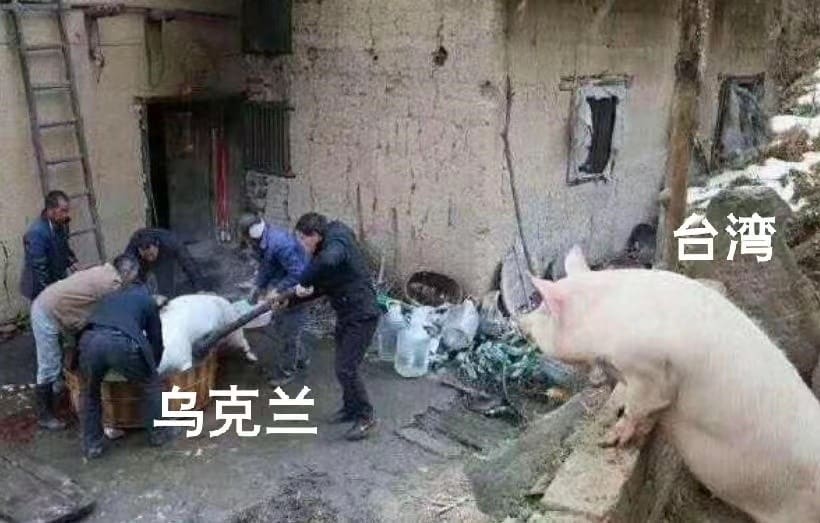
A meme circulating on social media in 2022 showing a pig “Taiwan” watching the slaughtering of another pig “Ukraine.”
This week, Chinese state media launched a large-scale social media propaganda campaign using strong language and clear visuals to reinforce the narrative that Taiwan is not a country, that it is part of China, and that reunification is inevitable.

Such rhetoric has appeared before, with similar peaks in Taiwan propaganda dating back to at least 2022. The topic of Taiwan has often been amplified during key political events, such as the 20th Party Congress and Xi Jinping’s speech in October 2022.
“Have you noticed?,” Weibo author Yangeisaibei (@雁归塞北) wrote: “Ever since Trump came to power and sold out Ukraine, the rhetoric towards Taiwan has become increasingly tough, the tones become more stern, and the words more straightforward.”
According to prominent Weibo blogger @前HR本人, who has over two million followers, the Taiwan issue is now more important than before.
💬 “When it comes to foreign struggles, resolving the Taiwan issue is China’s top priority. Judging from the Chinese Embassy in Washington declaring “We are not afraid of any kind of war with the US”, it seems we are already preparing to reunify Taiwan at any moment.”
Another Weibo blogger (@王江雨Law, 419k fans) wrote:
💬 “Now that all kinds of big and smaller developments are changing the [political] climate, especially if America’s strong territorial expansion claims turn into concrete actions, this could trigger synchronous reactions, greatly increasing the possibility of resolving the Taiwan issue within a few years. We need to rethink the previous view that the mainland is not in a hurry on this matter.”
What emerges from these discussions is that Chinese online discourse on the Russia-Ukraine war and US foreign policy is primarily centered around two key ideas:
🔸 The belief that China is ultimately at the core of US geopolitical strategies in its dealings with Russia.
🔸 A pragmatic, Sino-centric view in which support or opposition to leaders like Trump, Putin, or Zelensky shifts depending on what serves China’s interests best.
Rather than seeing the conflict in black-and-white terms, many Chinese netizens approach it as a dynamic political chess game, one in which China should play a smart and confident strategy.
Politics-focused blogger Mingshuzhatan (@明叔杂谈, 137k followers) wrote:
💬 “In the process of this game against US, we must respect them in tactics, and contempt them in strategy [战术上重视、战略上藐视] – stay patient and confident. Trump is currently going against the tide, he’s being destructive. But actually, this recklessness is damaging US credibility and its global influence, it will accelerate the decline of American hegemony. A silent majority of countries in the international community harbor growing resentment and disappointment toward the US, and when these sentiments reach a tipping point, America will truly experience the pain of “un unjust cause draws little support” [失道寡助]. China, on the other hand, although also facing some challenges, focuses on science and technological and industrial innovation. That’s the right path for China’s long-term stability, prosperity, and security. In the China-US competition, it is becoming increasingly evident that time is on China’s side.”
This perspective reflects a dominant theme across Chinese online discussions: No matter how intense the geopolitical shifts may be, or how much the US reshuffles its global strategy, China remains on its course and is playing the long game.🔚
By Manya Koetse
(follow on X, LinkedIn, or Instagram)
Spotted a mistake or want to add something? Please let us know in comments below or email us. First-time commenters, please be patient – we will have to manually approve your comment before it appears.
©2025 Whatsonweibo. All rights reserved. Do not reproduce our content without permission – you can contact us at info@whatsonweibo.com.
Subscribe

How K-pop Fans and the 13-Year-Old Daughter of Baidu VP Sparked a Debate on Online Privacy

Squat or Sit? China’s Great Toilet Debate and the Problem of Footprints on the Seat

Weibo Watch: The Great Squat vs Sitting Toilet Debate in China🧻

Chinese Netizens Turn to Tim Cook Over Battery Factory’s Illegal Overtime

Revisiting China’s Most Viral Resignation Letter: “The World Is So Big, I Want to Go and See It”

Our Picks: Top 10 Chinese Buzzwords and Phrases of 2024 Explained

“Dear Li Hua”: The TikTok/Xiaohongshu Honeymoon Explained

Beyond the Box Office: What’s Behind Ne Zha 2’s Success?

Weibo Watch: Christmas in China Is Everywhere and Nowhere

Weibo Watch: A New Chapter

15 Years of Weibo: The Evolution of China’s Social Media Giant

Tuning Into the Year of the Snake

The ‘China-chic Girl’ Image and the Realities of China’s Competitive Food Delivery Market

TikTok Refugees, Xiaohongshu, and the Letters from Li Hua

“Black Myth: Wukong”: From Gaming Screens to the CMG Spring Festival Gala?
Get in touch
Would you like to become a contributor, or do you have any tips or suggestions? Get in touch here!
Popular Reads
-

 China Insight11 months ago
China Insight11 months agoThe Tragic Story of “Fat Cat”: How a Chinese Gamer’s Suicide Went Viral
-

 China Music12 months ago
China Music12 months agoThe Chinese Viral TikTok Song Explained (No, It’s Not About Samsung)
-

 China Digital10 months ago
China Digital10 months agoChina’s 2024 Gaokao Triggers Online Discussions on AI
-

 China Arts & Entertainment11 months ago
China Arts & Entertainment11 months agoSinging Competition or Patriotic Fight? Hunan TV’s ‘Singer 2024’ Stirs Nationalistic Sentiments




